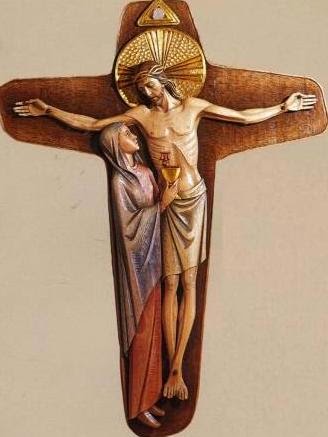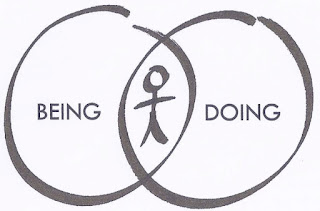Meditating on Mary at the Cross
“So they took Jesus, and he went out, bearing his own
cross, to the place called the place of a skull, which is called in Hebrew Golgotha.
There they crucified him, and with him two others, one on either side, and
Jesus between them
But standing by the cross of Jesus were his mother, and
his mother’s sister, Mary the wife of Clopas, and Mary Magdalene. When Jesus
saw his mother, and the disciple whom he loved standing near, he said to his
mother, “Woman, behold, your son!” Then he said to the disciple, “Behold, your
mother!” And from that hour the disciple took her to his own home.” (John 19:17-18, 25-27)
It is only John’s gospel that tells us that Mary was at the cross. Only
John who recorded the dying words of Jesus addressed to his mother. It was only
John because he was there too.
It
seems odd, even a bit cold, that Jesus would call his mother “woman”. But this
one word carries so much weight.
Eve
was the first woman and it is by “woman” that she is addressed in Genesis 3: “The
serpent said to the woman”.
Eve
stood at the foot of the tree in the garden. Eve chose to believe the lie of
the devil. She looked up at the fruit hanging on the tree with purely physical
eyes, considering its beauty. Eve lost faith, and disobeyed. She did this
because she was promised greater understanding and knowledge.
Mary,
whom the Fathers of the Church called the new Eve, stood at the foot of the
cross. Mary believed in the promises of God, that her son was the Messiah and
Savior of the word, the King of an everlasting kingdom. She looked at Jesus
hanging on the cross with spiritual eyes that looked beyond the pain,
suffering, and humiliation. Mary kept her faith and obeyed when everyone and
everything around her had lost hope. She did it without fully understanding God’s
plan, but trusting in him nonetheless.
Imagine
Mary at the cross looking upon the cruel execution of her son. They say that losing
a child is one of the most traumatic experiences a person can deal with—and I
hope I never do. She had to have been thinking about the words of the Angel so
many years before,
“Do not be afraid, Mary, for you have found favor with
God.
And behold, you will conceive in your womb and bear a
son,
and you shall call his name Jesus.
He will be great, and will be called the Son of the Most
High;
and the Lord God will give to him the throne of his
father David,
and he will reign over the house of Jacob for ever;
and of his kingdom there will be no end.” (Luke 1:30-33)
St.
Augustine said that “Mary first conceived in her heart by faith and then in her
womb” And now at the cross as she looks at her son she receives a second
annunciation of sorts. She is asked once again to become a mother, the mother
of the Church born from the blood and water flowing from the side of Christ. She
becomes my mother, your mother, the mother of all believers at the cross.
There’s
a scene in the movie Harry
Potter and the Half Blood Prince where Dumbledore says to Harry, “Once again I must ask too much of you.” Once again, so much is asked of Mary. To
take on the burden of being the mother of all the faithful, is also asking her
to take on the heartbreak of all who lose faith, all who reject Jesus, and even
those who would accept her son, but reject her.
But once again she says yes.
This
brings me back again to that word: woman. Jesus calls his mother “woman” one
other time in John’s gospel, at the wedding at Cana. The bridal party has run
out of wine. This was much more of a big deal in that time and culture than we
really appreciate now. It was a crisis. Mary’s response was to intercede with
Jesus on behalf of the bride and groom. She brought the troubled servants to
Jesus and told them “Do whatever he tells you.”
John
ran, just like all the other apostles. He followed Jesus at a distance during
the trials. But only John came to the cross. Is it a coincidence that he was
there with Mary? I suspect that John went to Mary and it was she that brought
him with her to Calvary. Once again Mary was leading a troubled servant, in a
crisis, to her son. And John did as Jesus told him; he took Mary into his home.
As
the “beloved disciple” John is supposed to represent all who would follow
Jesus. When reading the gospel of John we should be putting ourselves in the
place of the “disciple whom Jesus loved”. We should allow Mary to lead us to
Jesus, to the cross, to learn from her how to fully and completely surrender
everything to God. To come to Jesus and learn from him what he would have us
do.




Comments